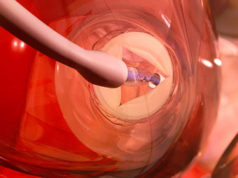Twelve-month results of the ENERGY registry were presented at EuroPCR. ENERGY is a registry in a broad patient population investigating the safety and clinical performance of the PRO-Kinetic Energy bare metal stent system (Boston Scientific) in 1,016 patients. Data confirmed the previously presented outcomes with a low MACE rate of only 6.5%.
The ENERGY study population included a high number of patients with acute coronary syndrome (46%), almost 30% were elderly (≥75 years) patients as well as 39% with highly complex lesions. The 12-month results confirmed the previously presented outcomes with a low MACE rate of only 6.5%. Cardiac death, myocardial infarction and target lesion revascularisation were 0.9%, 1.8% and 3.8% respectively. Even in the acute coronary syndrome subgroup which is a more high risk population and thus associated with higher event rates, MACE was only 6.2% at one year.
“Nowadays we are seeing more and more drug-eluting stents (DES) being used due to their increased efficacy over bare metal stents. However, especially for patients with acute coronary syndrome, it is very important to have high performing bare metal stents at hand. PRO-Kinetic Energy is such a high performer with outstanding deliverability and good efficacy that it can be more often used as an alternative to DES,” said Raimund Erbel, principal investigator from the West German Heart Center in Essen, Germany.
The PRO-Kinetic Energy is a thin strut (60μm) cobalt chromium bare metal stent, completely sealed with a thin layer of amorphous silicon carbide, Probio. This passive coating reduces the interaction between the metal stent and the surrounding tissue which makes the stent more haemocompatible.










